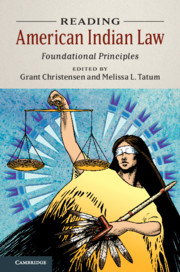Book contents
- Reading American Indian Law
- Reading American Indian Law
- Copyright page
- Dedication
- Contents
- Editors and Contributors
- Preface
- Acknowledgments
- Introduction
- Part I Core Concepts
- Part II Voices
- 5 “Life Comes from It”: Navajo Justice Concepts
- 6 Tribal Court Praxis: One Year in the Life of Twenty Indian Tribal Courts
- 7 Beyond Indian Law: The Rehnquist Court’s Pursuit of States’ Rights, Color-Blind Justice, and Mainstream Values
- 8 A Narrative of Sovereignty: Illuminating the Paradox of the Domestic Dependent Nation
- Part III Property
- Part IV (Mis)Understandings
- Book part
- References
6 - Tribal Court Praxis: One Year in the Life of Twenty Indian Tribal Courts
from Part II - Voices
Published online by Cambridge University Press: 11 December 2019
- Reading American Indian Law
- Reading American Indian Law
- Copyright page
- Dedication
- Contents
- Editors and Contributors
- Preface
- Acknowledgments
- Introduction
- Part I Core Concepts
- Part II Voices
- 5 “Life Comes from It”: Navajo Justice Concepts
- 6 Tribal Court Praxis: One Year in the Life of Twenty Indian Tribal Courts
- 7 Beyond Indian Law: The Rehnquist Court’s Pursuit of States’ Rights, Color-Blind Justice, and Mainstream Values
- 8 A Narrative of Sovereignty: Illuminating the Paradox of the Domestic Dependent Nation
- Part III Property
- Part IV (Mis)Understandings
- Book part
- References
Summary
Tribal Court Praxis: was among the first scholarly explorations of tribal courts. The piece reacts to a common prejudice that tribal courts are biased in favor of Indian parties and are insufficiently rigorous to be proper guarantors of justice. Newton surveys all tribal court opinions published in the 1996 edition of the Indian Law Reporter and ultimately shows that tribal courts are neutral, justice-administering institutions which, although varied in structure and composition, are actively engaged in a dialog about justice and legitimacy.
- Type
- Chapter
- Information
- Reading American Indian LawFoundational Principles, pp. 140 - 163Publisher: Cambridge University PressPrint publication year: 2019

